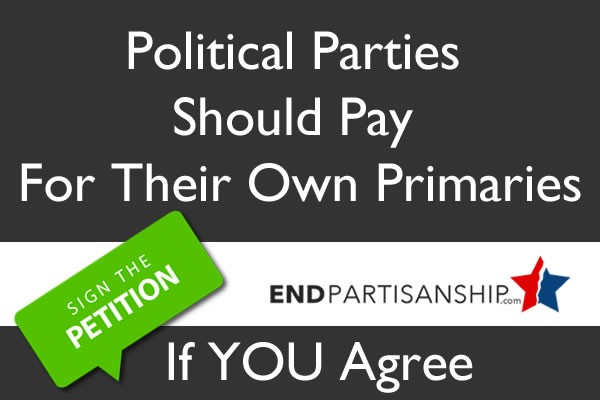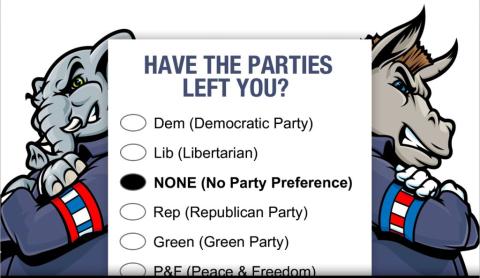Proposition 14 (“Prop 14”). The objective of Prop 14 was to produce more competitive elections and to give independent voters and other non-majority-party voters a say in the election. According to longtime Republican strategist, Allan Hoffenblum, it would reduce "meaningless runoffs."
California tried to implement a ‘blanket primary’ by way of referendum in 1996. The law allowed voters, regardless of political party, to vote in the partisan primary election of any party. The Supreme Court held that the system was unconstitutional in California Democratic Party v. Jones, 530 U.S. 567 (2000).
Prop 14, however, was modeled after Washington state’s Top Two Open Primary system. The system has been held constitutional “on its face” by the Supreme Court in Washington State Grange v. Washington State Republican Party, 552 U.S. 442 (2008).
The Top Two Open Primary “would force candidates to face all voters, including independents, in both the primary and the general elections.”
According to IVN.us, this means that, in most communities, “candidates and elected officials will have to answer to, and appeal to, a broader electorate rather than to the more narrow interests that can dominate low turnout primaries.”
Under this system, the two candidates with the highest and second highest vote totals in the primary election move on to the general election, ensuring that “elections are decided in the November general election when the highest numbers of people vote.”
All six qualified parties in California opposed Proposition 14. Both the California Republican Party and Libertarian Party candidate for Secretary of State, Christina Tobin, funded dedicated websites in opposition to Prop 14: www.stopprop14.com and www.stoptoptwo.org.
It is worth noting that IVN.us, promoters of the Open Primary, published several articles written by Proposition 14 opponents Christina Tobin and advocacy partner of long-time ballot access lawyer Richard Winger.
Ironically, then Republican Party Chairman Ron Nehring said Proposition 14 would put the selection of nominees in the hands of party bosses, instead of the voters (because bosses would choose who to endorse). Nehring did not point out that absent Proposition 14, the parties have always issued endorsements in partisan primaries.
Candidates are Incentivized to Appeal to a Broader Base of Voters
Through a series of amendments to the Elections Code, It has created a “voter nominated primary election” system for most partisan offices that are elected by statewide election. The proposition did not affect the partisan presidential primary election, in which parties may still choose to exclude non-member voters.Under the new Prop 14 system, parties no longer nominate candidates for the general election. Further, parties are no longer guaranteed to have a candidate advance to the general election.
Rather, all candidates for office appear on one primary ballot and voters cast a ballot for any of those individuals, regardless of party affiliation of either the voter or the candidate. The two candidates for each office who garner the highest vote totals advace to the general election.
This is similar to how Californians currently elect school boards, city councils, and county boards of supervisors, and how many governments conduct local non-partisan elections.Of particular note, Prop 14 eliminated the requirement that candidates not be affiliated with a party within 13 months prior to the election. It also reduced the signature barriers for independent candidates by subjecting them to the same nominating signature requirements that currently apply to partisan candidates.
Although candidates may express a party preference, the party does not nominate them. As a result, party nominees are no longer guaranteed a spot on the general election ballot. Moreover, it is possible that both candidates may express the same party preference for the general election run-off.
Political parties can still endorse candidates and give candidates financial and organizational support. Prop 14 did not affect the current partisan primary elections for president, or for party committee offices. However, Prop 14 does enable greater dialogue in the primary portion of each campaign, because it shifts the dialogue of the campaign at an early point in the process.
Rather than campaigns that focus on partisan-based issues that appeal to the small portion of the electorate that actually votes in partisan elections, candidates are incentivized to appeal to a broader base of voters, across partisan lines.
The Open Primary will Increase Voter Turnout
The historically low voter participation among nonpartisan voters should be contrasted with the 2010 primary election in which Proposition 14 was on the ballot. In that election, the Independent Voter Project, among other organizations, conducted voter education programs to inform independent voters that there was a proposition on the ballot that would affect the way they participated in the process.
As a consequence, there was a 90 percent increase in independent voter participation over the previous non-presidential primary election of 2006, an increase of over 400,000 voters.
While political consultants and the media in general often attribute independents’ general lack of participation to apathy or disengagement, the unprecedented increase in nonpartisan voter turnout in 2010 proves that independent voters are motivated to participate in the process when they have an opportunity to give a ‘meaningful vote.’
Parties Try, and Fail, to Challenge to the Open Primary
Even before Proposition 14 was passed, the party-controlled legislature tried to undermine the potential success of the initiative.
In March 2010, political leaders inside the California Legislature struck a backroom deal whereby the opponents of Prop 14 sued the secretary of state over the description of the proposition that was to appear on June’s primary ballot. The proponents of the lawsuit did not inform the proponents of Prop 14 that the suit was filed.
The California Legislature used the California School Employees Association (CSEA), a special interest group that gave over $421,000 to the Democratic Party in 2010, to file a lawsuit against the California Legislature. Thereby, the “State” would agree to the opponents’ stipulated terms, forcing a change in terms by judicial mandate without giving the opposition an opportunity to object.
The CSEA’s proposed language:
Changes primary election process. Changes primary election procedures for congressional, legislative and statewide races. Allows all voters to choose any candidate regardless of the candidate’s or voter’s political party preference. Does not require candidates to disclose their registered political party preference. Eliminates political parties’ rights to be on the general election ballot. Ensures that only the two candidates receiving the greatest number of votes will appear on the general election ballot regardless of their registered political party preference. Does not change primary election for President, party committee officers, and nonpartisan offices.
Why didn’t the CSEA sue the proponents of Proposition 14 instead of the legislature? Because the supporters of the Open Primary were the real interested party and would and did object to the change once the tactic was discovered.
Steve Merksamer, partner of Neilson-Merksamer, the law firm that successfully intervened on behalf of the proponents said, “I've been in this business for over 40 years, and I have witnessed a lot of outrageous behavior. I must say I have never seen a more cynical or shameful attempted abuse of power."
Party leaders, whether Democrats, Republicans, or third parties, have understandably felt the threat of a nonpartisan-based primary to their ability to control both the outcome and the dialogue of political elections. Following the passage of Proposition 14, there have been three more court challenges to Proposition 14:
First, inChamness v. Bowen, the plaintiff challenged the constitutionality of Prop 14 on two equal protection grounds: (1) a “party preference” may only be listed for candidates who refer a “qualified party”; (2) write-in space is printed on ballots but write-ins can’t be counted.
The federal district court in Los Angeles rejected the claims, granting summary judgment in favor of the defendants and interveners. The plaintiffs appealed the judgment, which was later denied by the Ninth Circuit Court.
The second lawsuit, Field v. Bowen, was filed against Senate Bill 6, which paved the way for Proposition 14. The lawsuit paralleled most of the arguments made in Chamness v. Bowen. The Republican, Democrat, Green, Peace and Freedom, and Libertarian parties supported the lawsuit.
Again, the two main challenges in the lawsuit were to the requirement that write-in votes in runoff elections be discarded and that candidates be prevented from listing their party affiliation on the general election ballot. In December 2010, the California Supreme Court denied the request for an injunction against Prop 14. In September, the court again ruled against the plaintiffs.
Finally, in Rubin v. Bowen, three third parties (Libertarian, Peace and Freedom, and Green) joined together to challenge the constitutionality of Proposition 14.
The lawsuit alleged:
- Minor party candidates are denied access to the general election ballot under the new rules;
- Minor Parties are deprived of their ‘principle method of ballot qualification” because the new rules preclude most, if not all, minor party candidates from qualifying for the general election ballot; and
- The use of the ‘party preference’ designation would cause voter confusion because voters might believe that candidates are actually endorsed by the party they “prefer” on the ballot.
On April 10, 2012, the judge rejected the first and third causes of action (relating to the minor parties’ inability to make the general election ballot, and supposed voter “confusion” of candidates who “prefer” a party with that party’s official nominee, respectively) on the ground that he believes plaintiffs are alleging facial challenges. Under the Washington State Grange case, such facial challenges are precluded.
The second cause of action, based on purported violations of the Elections Clause of the U.S. Constitution, was rejected for insufficient specificity. This leaves the door open for the third parties to amend their challenge. The challenge will be heard after the June 5 election on July 10, 2012.
The Open Primary Embraces the Very Ideals that the Parties Claim to Represent
The irony in all three failed lawsuits is that the parties base their challenges to the constitutionality of Proposition 14 on the presumption that parties have ‘the right’ to be on the general election ballot. Even the Libertarian party, the supposed champions of individual rights, join together to argue that a party’s right to be on the general election ballot is greater than an individual's right to have meaningful participation in the political process.
If the irony is not explicit, it is noteworthy.The basis of each lawsuit was, in essence, that candidates who seek either a write-in candidacy or a third party designation are unable to do so under the new rules. Yet, under the old rules, neither a write-in candidate nor a third party candidate has ever won (or even come close to winning) a statewide office in California’s entire history.
Further, under the new system, everyone, regardless of party, is given an equal opportunity to be placed on the primary ballot and seek qualification for the general, as opposed to the previous system which provided lower barriers to entry for members of political parties.
A more consistently “libertarian” position would provide the individual with a superior right to ballot access than that of any party. A more “Democratic” position would advocate for an electoral process where the most people have an opportunity to have a meaningful vote. And a more “Republican” position would have candidates run to represent the people of the district, not members of their party’s central committee.
Proposition 14 represents the spirit of these ideals, which makes one question the motivations of those who oppose it.

